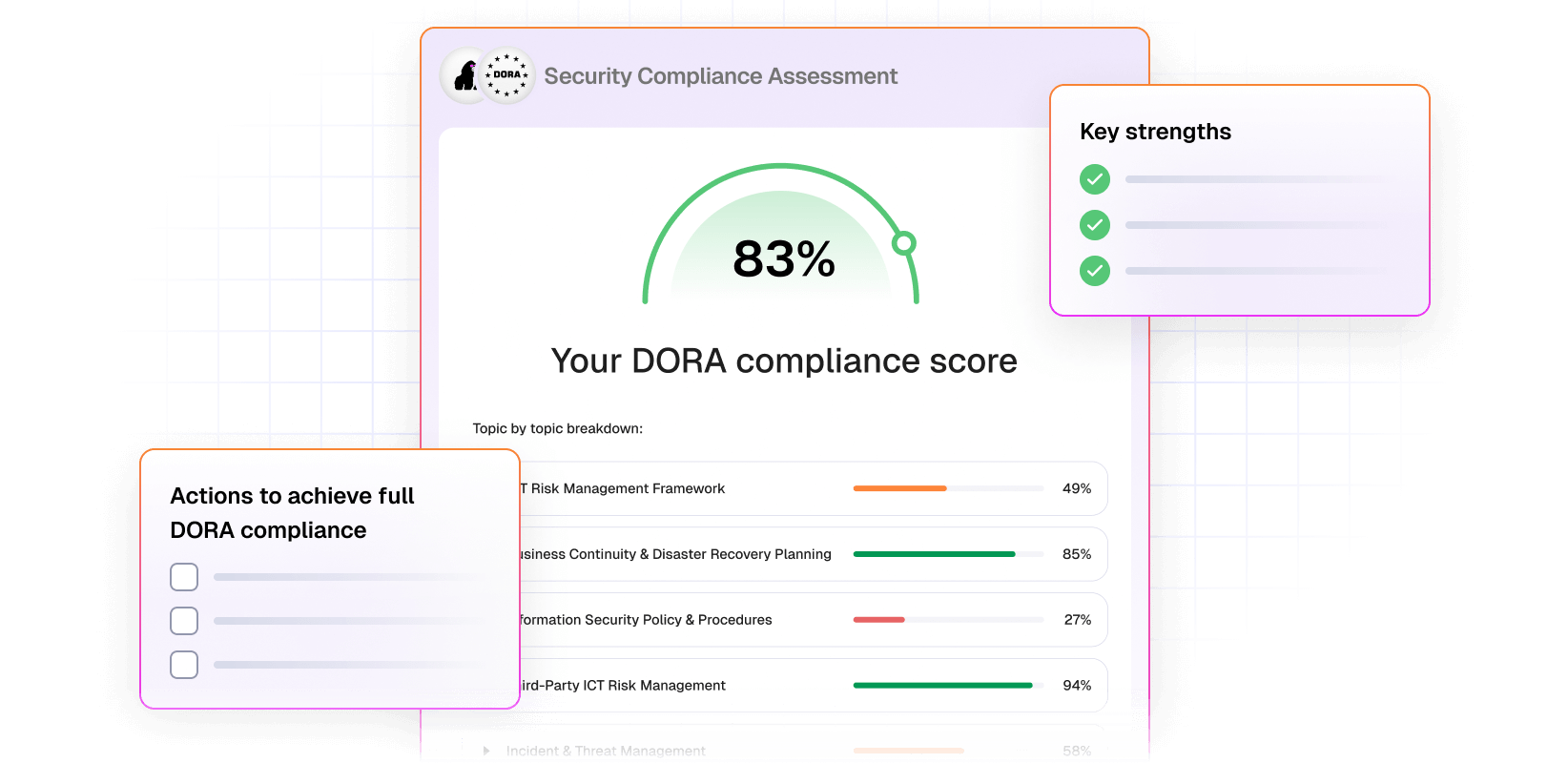Greece has made substantial strides in modernizing its financial system and broader digital infrastructure, from the rapid expansion of online banking services to a growing fintech ecosystem. In tandem, European regulators have introduced the Digital Operational Resilience Act (DORA) to ensure standardized, robust defenses against cyber threats and operational disruptions. This post explores how DORA is being implemented in Greece, assesses whether the process differs from other EU nations, and examines Greek regulations that already reflect DORA’s objectives. I’ll also provide a brief list of auditors in Greece who can guide businesses toward DORA compliance.

Assess your DORA readiness for free!
Evaluate your organization’s compliance gaps and find areas for improvement—no prior DORA knowledge needed.
Why DORA matters in Greece
As in other EU countries, DORA’s rules on ICT risk management, incident reporting, and third-party oversight primarily target banks, insurers, and investment firms. However, Greece’s interconnected financial sector means a wide range of organizations—such as tech vendors and cloud providers—will also be affected. The Bank of Greece, the Hellenic Capital Market Commission (HCMC), and the Hellenic Financial Stability Fund (HFSF) have historically guided the sector toward higher regulatory and operational standards. By bringing uniformity to cybersecurity and resilience requirements, DORA helps Greece reinforce these standards across both established financial entities and newer players in the digital economy.
PRO TIP
If you support banks or insurers—even indirectly—conduct a DORA-readiness review to assess whether your existing risk assessments and incident procedures meet EU-level expectations.
Is Greece’s approach different from other eu member states?
All EU member states must incorporate DORA’s core principles into local frameworks, but each has unique supervisory structures and legislative processes. In Greece, the Bank of Greece oversees monetary policy and supervises banks, while the HCMC regulates the capital markets. Both are likely to issue clarifications or additional guidance to align DORA with existing Greek legislation. Given Greece’s track record of implementing EU directives (such as PSD2 and the NIS Directive), the process should be relatively straightforward, though local details—like the specific timelines for incident reporting—may need fine-tuning.
Compared with countries that have multiple decentralized bodies, Greece’s concentrated regulatory environment can speed up the adaptation of EU rules. That said, organizations operating in multiple EU markets must remain vigilant about subtle differences in how DORA’s provisions are enforced across different jurisdictions.
PRO TIP
Monitor circulars and technical guidance from Greek regulators. These may clarify how DORA integrates with existing obligations under PSD2, NIS, or sector-specific frameworks.
Existing Greek regulations aligning with DORA
Before DORA, Greece had various measures aimed at strengthening cyber defenses and operational resilience within critical sectors. The table below highlights some key regulations and how they connect to DORA’s requirements:
| Regulation or measure | Focus area | How it aligns with DORA |
| Bank of Greece directives on operational and ICT risk management | Lays out rules for banks and payment institutions regarding internal controls and third-party vendor oversight | Mirrors DORA’s emphasis on structured risk management, vendor due diligence, and resilience planning |
| HCMC guidelines for investment firms | Covers investor protection, information security, and continuity plans for capital market participants | Overlaps with DORA’s focus on incident reporting and ICT oversight |
| Greek implementation of the NIS Directive | Establishes baseline cybersecurity obligations for essential and digital service providers | Aligns with DORA’s call for consistent cyber risk monitoring and mandatory breach notifications |
These frameworks mean Greek financial institutions already exercise considerable diligence in risk governance. DORA takes that a step further by ensuring a standardized, cross-border approach, compelling all stakeholders to meet uniform benchmarks.
PRO TIP
Use your compliance with BoG or HCMC rules as a baseline. Then layer in structured documentation and EU-compliant reporting processes to bridge the final gap to DORA.
Impact beyond finance
Even though DORA is primarily aimed at financial entities, the interconnected nature of Greece’s digital economy means a wide spectrum of businesses will feel its effects. Third-party vendors—such as software developers, consulting firms, and cloud service providers—can expect more rigorous scrutiny of their own ICT controls, given that a breach in a non-financial player could trigger compliance obligations for a regulated entity. For Greece’s growing tech scene, this could mean enhanced cybersecurity measures, clearer incident response protocols, and tighter service-level agreements with clients in the financial sector.
PRO TIP
Update service-level agreements (SLAs) and contracts to include DORA-aligned terms—especially around incident response times, breach notification duties, and audit rights.
List of DORA auditors in Greece
DORA does not designate a formal roster of auditors, but several established consulting and auditing firms in Greece specialize in operational risk, cybersecurity, and regulatory compliance. Below is a snapshot of potential partners:
| Firm | Primary expertise | Additional notes |
| Deloitte Greece | Cyber risk, operational audits, governance, and compliance | Global network, experienced in local and EU regulations |
| KPMG Greece | ICT risk assessment, financial sector audits, internal controls | Known for its work with major banks and insurance companies |
| PwC Greece | Cybersecurity, data privacy, incident management | Offers tailored solutions for a range of financial institutions |
| EY Greece | IT audits, regulatory consulting, digital transformation | Experience integrating cross-border compliance frameworks |
| Grant Thornton Greece | Enterprise risk management, operational resilience, internal audits | Focuses on mid-sized financial entities and broader corporate clients |
| Priority Consultants | Local firm specializing in cybersecurity and compliance | Greek-based team with expertise in industry-specific regulations |
When selecting an auditor, organizations should confirm that the firm understands both Greek financial regulations and the broader EU directives shaping DORA. A track record of guiding companies through PSD2 or similar regulatory changes often indicates a strong foundation for DORA-related work.
DORA in Greece: Fortifying digital finance with CyberUpgrade
Greek banks, insurers, and fintechs must now meet DORA’s rigorous ICT risk, incident reporting, and third-party oversight standards—especially when serving EU clients. CyberUpgrade streamlines this transition by mapping your existing Bank of Greece and HCMC controls directly to DORA’s unified framework, automatically surfacing gaps, orchestrating vendor assessments, and generating audit-ready evidence in minutes.
Our platform brings real-time compliance into Slack or Teams, so every vulnerability scan, risk analysis, and incident escalation is logged centrally and stored for regulator review. You’ll reduce manual effort by up to 80%, maintain continuous monitoring, and never miss a reporting deadline—transforming DORA from a burden into a competitive edge for growth and innovation.
Forging a secure digital path
Greece’s adoption of DORA comes at a time when digital channels are more crucial than ever to the financial sector’s success. While the Act introduces additional layers of accountability, it also offers a unifying roadmap to stronger, more consistent cyber defenses and operational safeguards. By folding DORA into existing regulations, Greece can improve the resilience of its financial system without reinventing the wheel. For forward-thinking organizations, the regulatory shift under DORA is both a challenge and an opportunity—one that can elevate their cybersecurity posture and reinforce market confidence in an increasingly connected global economy.

Assess your DORA readiness for free!
Evaluate your organization’s compliance gaps and find areas for improvement—no prior DORA knowledge needed.









